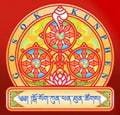Virupa, « The Dakini-Master », was one of the 84 Indian Vajrayana Mahasiddhas….
畢魯巴, »空行母大師 »,是古印度金剛乘八十四大成就者之一….
畢魯巴誕生於阿札第哇帕拉地的哲烏拉,於印度索瑪普利大寺出家,受具足戒。此後在十二年的修行中毫無收穫,並因此絕望放棄。此時有空行母加持,並請其努力摒棄妄念與分別心。此後畢魯巴再經過十二年禪修,獲得證悟。
之後因為吃鴿子肉與酒,被逐出寺廟,開始瑜伽士的生涯。之後畢魯巴通過喝酒展示神通,使三天時間太陽不曾移動,以及在印札等外道地方展示神通。並在印度東方的第米過第等地通過加持,保護婆羅門子免受當地羅剎殺戮,並使眾羅剎皆發誓禁止傷害皈依三寶者。其後,大師回至空行淨土。(維基百科)
Virupa entered the Buddhist monastic academy of Somapuri when he was young. He studied, meditated and received the initiation and empowerment of the dakini Vajra Varahi. For 12 years, he recited her mantra 10 million times twice. However, he never received any sign of progress. Disgusted of himself, he threw away his rosary. That evening, Vajra Varahi appeared before him and gave him a carved rosary and said:
“Child of Happiness, why are you so troubled? Keep up your practice, for you are blessed by me. If you would see clearly that things are neither this nor that, you must let go your wandering, critical thoughts. Strip your mind of illusion!”
Deeply inspired, he renewed his practice for another 12 years and gained the realization of mahamudra. As he attained power over the duality of life and death, he saw no contradiction in eating meat or drinking alcohol. When the abbot of the monastery found out he ate a pigeon pie, he was ordered to leave the monastery. He prostrated before the Buddha images and left, treading lightly from lotus to lotus on the lotus-filled lake. Upon witnessing his amazing feat, the monks prostrated to Virupa and begged him to return. They asked him why did he killed the pigeons. He replied, “That was simply an illusion, like all temporal phenomena”. He then took scraps of the pigeon wing, held them and with a snap of his fingers the pigeons came back to life.
Virupa then left the monastery and became a yogin. Wherever he went, people would tell tales of his miraculous doings. One such miraculous deed was when he travelled to Devikotta in eastern India and was imprisoned by flesh-eating ghouls. In the abandoned temple where he was imprisoned, he met a young Brahmin boy who was scared and began to weep. Virupa comforted him and blessed him with a powerful mantra of protection. At moonrise, two thugs came to fetch the boy but were unable to lift him off the ground. So they decided to take Virupa instead. Unable to move as he was under their spell, Virupa watched the drunken ghouls brandishing their ritual knives in readiness for slaughter. Virupa then burst into laughter. Surprised, but amused, the ghouls began laughing louder, but their glee soon turned into horror when Virupa’s terrible twelve-tone bellow – the laughter of Heruka – became louder and louder until the ghouls begged him to stop. Virupa told them he would do so only if they vowed to devote themselves to the teachings of the Buddha. When his deafening laughter rang once again, they prostrated themselves before him and swore to do his bidding. He then rose, in his right hand appeared an enormous razor-sharp discus, and behind him stood the horrific presence of the Demon of the North. Virupa then said “should you entertain the slightest thought of not renewing your pledge to the Buddha every day, expect to lose a cup of blood each day you fall from the path. And should you turn away entirely from the Buddha’s law and worship some other god, this discus will fly from the heavens and sever your head from your neck, and the Demon of the North will suck your veins dry.”
The great dakini master was not to attain ultimate liberation until he had lived seven hundred years, and at last completed, Virupa ascended to the Paradise of the Dakinis.
Mahasiddha Vinapa ||
大成就者 維納巴
84 Mahasiddhas ||
84 大成就者
Mahasiddha Vyalipa ||
大成就者 貝利巴



